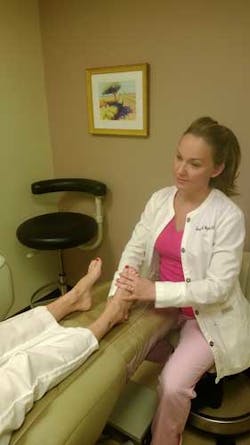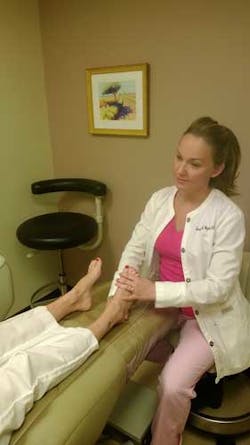Reflexology in the dental chair
The word dentistry has long been synonymous with such four letter words as pain and ouch. However, during the last 12 years that I’ve been a dental assistant, I’ve witnessed patient after patient have a positive experience, and I’ve helped them leave their dental anxiety at the door. After all, that’s why I pursued this profession. As a scared little girl facing a very intimidating oral surgery, a sweet and caring woman who assisted the oral surgeon took great care of me. I knew firsthand the fear of the unknown in the dental chair, and I never wanted others to have that same feeling. Isn’t that why we became dental assistants?
The practice I work in is known for its natural approach with patients, so for our patients to see me rubbing a patient’s foot is not completely out of the box for them. Instead of assisting the doctor, I actually perform Reflexology and Reiki during a dental procedure. Reflexology is a system of applying pressure and massage to relieve tension and treat illness, based on the theory that there are reflex points on the feet, hands, and head connected to every part of the body. The practice of Reiki is a healing technique based on the principle that the therapist can channel energy (Qi or Chi) into the patient by means of touch, activating the patient's body to heal and restore harmony to the person’s emotional and physical body.
Let’s take this a step further. Imagine working on a patient who in the past has been tense, uptight, maybe even nasty and short with you. Only this visit they are relaxed, calm, and nice to talk to. Your interaction with the patient leaves not only the patient, but you and the doctor in a calm and stress-free place. My boss and mentor, Dr. Jeffrey Oras, has searched for pieces to the dentistry puzzle for years. His book, “Tooth Sense,” explains why patients who have the same procedure react so differently and require this extra step of care. It was this concept that led me to the feet of our patients.
My exposure to alternative medicine and the many practitioners our office works with led me to pursue certifications in Reflexology and Reiki. I began simply for my own knowledge. In the fall of 2012, Dr. Oras and I thought we would try it and see how it would be to apply these practices in the dental chair. The results were amazing. When Reflexology is applied before, during, and after a dental appointment, the level of relaxation is undeniable. The patient is no longer stressed and tense, therefore the person can gently allow the dental work to be done without fighting it. The cheeks are relaxed. The tongue is relaxed. The gag reflex is decreased. The coughing, swallowing, and excessive spitting is decreased. The doctor and assistant efficiently perform the procedure and walk away with no angst or frustration. In fact, since I am at the feet during some procedures the doctor does most of the procedure without another assistant because the dentistry is much easier to do.
---------------------------------------------------------------
RELATED ARTICLES:
Dental assistants can help eliminate patient fear of dentistry
Dental assistants believe certification issues affect salaries
--------------------------------------------------------------
As you can imagine, introducing this concept to new patients often requires a bit of explaining. With the increasing awareness of all things holistic, most people have a general knowledge of chiropractic, massage, or acupuncture. The Chinese Tooth and Organ Chart, which has been a mainstay in our office for years, connects each tooth to corresponding organs, body part, or emotion. I use this as I work on the feet to focus attention to the areas that correspond to the tooth being working on. This creates a whole body healing process. The benefits of these practices do not end with relaxation. Our patients have reported less post-operative tooth sensitivity, and for some, discomfort in other areas of their bodies subside. We heard if one case of tinnitus subsiding, and another patient’s MS symptoms eased.
In spite of its reputation and history, dentistry is a safe, calm, and even therapeutic experience for my patients. While I cannot expect you to want to rub your patient’s feet, I can leave you with the knowledge that you and all of your patients can have calm and relaxed dental procedures together. I look to further taking what I’ve learned from my patients and their feedback and expanding on it. And I look forward to sharing this knowledge with other dental and medical professionals.
Editor's note: Some states may have requirements for performing reflexology. Check with your state for information on reflexology or massage therapy regulations. Also, check with the state dental board to be sure practicing reflexology, massage therapy, or other alternative treatments do not conflict with the scope of the dental practice act.
Kristen Belcastro is a Registered Dental Assistant in western New Jersey and has been in dentistry for 12 years. She obtained her Dental Assisting Certificate from Warren County Community College and her Reflexology Certificate from Northeast Holistic Center.

